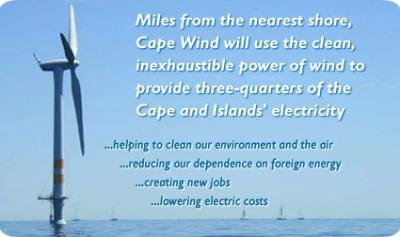The plan to build the nations first offshore wind farm passed a major hurdle today. The state’s secretary of energy and environmental affairs, Ian Bowles, approved the report in a ruling announced today,saying it complies with state environmental laws.
“Overall the Cape Wind project will contribute to the long-term preservation and enhancement of our environment,” Bowles said.
It’s nice that after years of going back and forth that the project has a state approved environmental document. Bowles has determined that the Final Environmental Impact Report submitted by the Cape Wind wind farm project “adequately and properly complies†(pdf of approval letter) with the Massachusetts Environmental Policy Act. The project can now advance to the state permitting process.
Cape Wind involves the development of 130 Wind Turbine Generators on a grid over 25 square miles in Nantucket Sound known as Horseshoe Shoals, located in federal waters. The project also includes cables that transmit the electric power to the mainland, making landfall in the Town of Yarmouth and passing through Massachusetts’s territorial waters, generally three nautical miles from shore. The portion of Cape Wind located in federal waters is currently under federal environmental review led by the US Department of the Interior, Minerals Management Service.
“My obligation under MEPA is to ensure that the impacts of construction and operation of the portions of the project within Massachusetts’s jurisdiction have been adequately avoided, minimized, and mitigated. I find that they have,†said Secretary Bowles. “Based on the air quality benefits, as well as the compensatory mitigation measures detailed in this Certificate, I find that the environmental benefits and compensatory mitigation provided by the project are adequate to mitigate the impacts of the project occurring in Massachusetts.â€
The $10 million Cape Wind mitigation package consists of:
- $780,000 towards the restoration of Bird Island, off the town of Marion in Buzzards Bay. At 1.5 acres in size, Bird Island provides prime nesting habitat for Roseate and Common Terns, but the island is subject to significant and accelerating erosion. The enhancement of nesting habitat on Bird Island will benefit the same tern population that is subject to potential impacts from the wind turbine array.
- $4.22 million towards natural resource preservation, marine habitat restoration, and coastal recreation enhancement projects in the area of Cape Cod, Nantucket, and Martha’s Vineyard.
- An estimated $5.6 million in Federal Lease Payments over 20 years, representing 27 percent of the revenues received by the federal government.
Which to me doesn’t look anything like the “public land grab” cape wind opponents have been screaming about. They are going to provide low cost renewable energy to the grid, pay millions in land leases, pay additional millions to restore bird breeding ground, and now have a state approved environmental document. But that’s not all.
Continue reading Cape Wind Wins State Approval, And May Soon Have A Long Term Energy Contract
